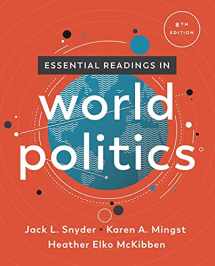
Essential Readings in World Politics (The Norton Series in World Politics)
Book details
Summary
Description
Product Description
A balanced collection of readings―refreshed and reimagined With 30% new readings in the Eighth Edition,
Essential Readings in World Politics introduces students to key classic and contemporary works in international relations. The selections in each chapter reflect diverse perspectives on major topics in international relations, and the headnotes provide the context and background that introductory students need. In the Eighth Edition, new readings offer diverse perspectives on current topics such the environment, global health, China’s role in the global order, and the future of globalization.
About the Author
Jack L. Snyder is the Robert and Renee Belfer Professor of International Relations in the Department of Political Science and the Saltzman Institute of War and Peace Studies at Columbia University. He holds a Ph.D. from Columbia. His books include
Electing to Fight: Why Emerging Democracies Go to War, coauthored with Edward D. Mansfield (MIT Press, 2007) and
From Voting to Violence: Democratization and Nationalist Conflict (W.W. Norton, 2000). His articles on such topics as crisis diplomacy, democratization and war, nationalism, imperial overstretch, war crimes tribunals versus amnesties, international relations theory after September 11, and anarchy and culture have appeared in
Foreign Affairs,
Foreign Policy,
International Organization,
International Security, and
World Politics. Professor Snyder teaches graduate and undergraduate courses on nationalism, comparative methods, and grand strategy. Professor Snyder is a Fellow of the American Academy of Arts and Sciences and an elected member of Columbia's Arts and Sciences Policy and Planning Committee. He is the editor of the Norton Series in World Politics.
Karen A. Mingst is Professor Emeritus at the Patterson School of Diplomacy and International Commerce at the University of Kentucky. She holds a PhD in political science from the University of Wisconsin. A specialist in international organization, international law, and international political economy, Professor Mingst has conducted research in Western Europe, West Africa, and Yugoslavia. She is the author or editor of seven books and numerous academic articles. She has frequently taught the introductory international relations course. In addition, she has traveled and lectured extensively at universities around the globe.
Heather Elko McKibben is an associate professor in the Department of Political Science at the University of California, Davis. She has been at Davis since 2009, after receiving her PhD from the University of Pittsburgh in 2008 and holding a postdoctorate position in the Niehaus Center for Globalization and Governance at Princeton University in the 2008–2009 academic year. In her research, Professor McKibben is interested in understanding when, why and how different countries negotiate with each other. When and why will countries come to the negotiating table to resolve problems instead of resorting to more coercive measures? What types of strategies do they use in those negotiations, and why do those strategies differ from country to country and negotiation to negotiation? When and why will countries be able to reach cooperative agreements, and what are the resulting agreements likely to look like? Examining international negotiations in a wide variety of settings, Professor McKibben seeks to answer these types of questions.


We would LOVE it if you could help us and other readers by reviewing the book
Book review



